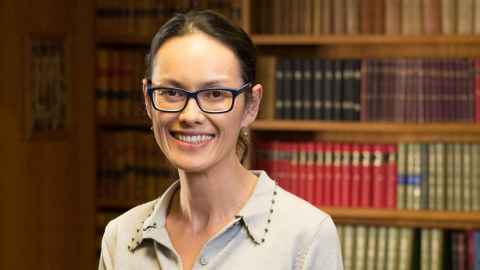New law appointment makes history
18 February 2020
Congratulations to Associate Professor Amokura Kawharu (Ngāpuhi and Ngāti Whatua), for her appointment as the next president of the New Zealand Law Commission.

A highly respected member of the Auckland Law School’s academic staff, her selection marks an important moment in legal history as both the first Māori, and the first woman appointed to the prestigious role.
“This is a very significant appointment offering the opportunity to shape the law,” says Professor Penelope Mathew, Dean of Law, Auckland Law School. “The faculty is very proud of Associate Professor Kawharu’s elevation to this key role, knowing that she will bring important skills and knowledge to it. While the faculty will miss Amokura as a colleague, we are all delighted for her.”
The president of the Law Commission is appointed by the Governor-General, on the advice of the Justice Minister, and must be a Judge or retired Judge of the Court of Appeal or the High Court, or a barrister or solicitor of the High Court of not less than 7 years' practice.
Kawharu holds a Bachelor of Arts and a Bachelor of Law degrees (with Honours) from the University of Auckland and a Masters of Laws (1st Class) with a major in international law from the University of Cambridge.
Her research interests include international trade and investment law, arbitration, and international disputes resolution. She has published widely in these fields, including as co-author of the leading New Zealand text on arbitration law with Sir David Williams QC, Williams & Kawharu on Arbitration.
“We feel enormous pride as Māori legal academics and lawyers that Amokura has been appointed to such a senior and significant role in the law in the country. Her knowledge of private law including commercial law, land law, arbitration and international trade coupled with her embeddedness within the Maori legal community makes her an ideal choice,” says Associate Professor Claire Charters, Auckland Law School.
On announcing the appointment Justice Minister Andrew Little said Kawharu would bring some great attributes to the role.
Amokura Kawharu has the ability to lead an innovative and
forward-looking approach to the law reform process, and brings extensive
networks throughout Māoridom and academic circles that can assist in
how the Commission addresses its responsibilities regarding te ao Māori.
"Amokura Kawharu has the ability to lead an innovative and forward-looking approach to the law reform process, and brings extensive networks throughout Māoridom and academic circles that can assist in how the Commission addresses its responsibilities regarding te ao Māori," he said.
Professor Julia Tolmie from Auckland Law School says “Amokura has a fierce intellect, integrity and tenacity. She is not afraid to stand up for her principles, even when taking a stand extracts a personal cost. She has the capacity to bring polarised groups of people together, united in their respect for her and her good sense - her capacity to navigate complex and stressful realities with grace and calm and to hold the perspective of everyone in that process. She has emerged during her time at Auckland Law School as an inspiring and visionary leader amongst her colleagues. It follows that, whilst I am really sad that her time here has come to an end, I am also excited by what her appointment means for New Zealand and, particularly, the capacity of the legal system to better serve New Zealanders into the future."
The principal functions of the Law Commission are to take and keep under review in a systematic way the law of New Zealand, and to make recommendations for its reform and development.
Kawharu will take over from Deputy President Helen McQueen in May.
Media queries
Miranda Playfair | Media Adviser
Mob: 021 063 8393
Email: m.playfair@auckland.ac.nz